Budget 2024 Expectations

Article byIDEA Consulting Research TeamPublished on Wed Nov 01 202316 minute read
Executive Summary
The 2024 Malta Budget Expectations Survey, presented by Malta Survey, carried out research to identify the public needs and sentiments prior to the said budget being presented by the Government on Monday October 30th 2023. The findings of the survey include the following:
- A significant need for control over the nation’s food prices and a review of the wage structures was identified;
- A priority for Government Authorities and Agencies to reduce their spending and make overall better use of their funds was established;
- Health, environment and education were the top three sectors to be foundas priorities for Budget 2024’s investment; and
- An overall negative sentiment on whether Budget 2024 will meet the needs of the participants was found.
Introduction
The objective of this survey is to conduct a comprehensive analysis of public sentiment concerning the 2024 budget. More precisely, this survey, crafted after extensive research into the prevalent topics of discussion among the general populace, delves into the issues that are perceived as significant by the public and how the Government should respond to these prevailing concerns.
MaltaSurvey.com, a platform empowered by IDEA Consulting, a division of IDEA Group, remains a unique arena where citizens can openly and voluntarily express their views on various subjects whilst respecting the scientific method of conducting public quantitative research. It is important to emphasise that this platform operates independently of any political party or media organisation. Our primary mission is to utilise this platform to bring forth prevalent ideas and perspectives while assessing the responses in accordance with current societal trends.
The Malta Budget 2024 Expectations Survey was structured into four distinct sections. In addition to obtaining essential demographic insights, the survey explored (a) topics of concern, (b), priorities for government action, (c) strategies for addressing the prevailing budget deficit, and (d) the general sentiment regarding the adequacy of this budget in meeting personal needs.
Methodology
Stratified Sampling
In order to obtain a representative sample, the NSO’s latest census document was utilised to gather data on public population proportions including gender, age and regional allocation. These were considered as strata for the sample to be constructed during the data collection process.
Data Gathering
Being an online platform, MaltaSurvey published its survey for collection on its website which is accessible to the public without any authentication required. This is to respect one’s anonymity. Data was collected between the 10th and the 23rd of October 2023.
In order to be made aware of the survey, adverts were placed through online advertisement tools such as GoogleAds and Meta Ads. By constant observation of the sample, the advertisements’ targeting was continuously fine-tuned to gather portions of the sample that were necessary rather than opting for an across-the-board approach. This was possible through MaltaSurvey’s real-time data collection dashboard. Once more, the identity of the respondent was unknown during this process; all that was known was the strata that were being exposed to the advertisements at any given point in time.
Participants could only answer the survey using MaltaSurvey’s website. Social media comments, reactions, shares and engagements did not count as submissions. Partial responses were not accepted either. Thus, the results in this survey comprise only complete submissions. Participants opted to perform the survey purely on a voluntary basis and had the right to decline or exit the survey at any point in time.
In order to maintain the integrity and reliability of the online survey, a verification code system was implemented, requiring participants to enter their mobile numbers, which were encrypted before processing for the conservation of anonymity. This was part of MaltaSurvey’s multi-layer strategy to detect and prevent duplicate submissions. MaltaSurvey guarantees that raw phone numbers are not stored and thus will never be used for any purpose other than to verify a participant’s voluntary submission. This is one of many implicit layers to ensure the survey’s trustworthiness and validity.
Data Processing & Analysis
As monitoring of the strata proportions was being done continuously and since all submissions accepted had to be fully complete to be allowed, there was minimal cleaning and pre-processing to be done with the exception of the encoding process.
To enhance the representativeness of our sample and ensure that the survey findings accurately reflected the broader population, a robust post-stratification weighting process was carried out. This meticulous procedure involved the careful categorisation of our sample based on key demographic variables, specifically Gender, Age and Region. By segmenting the data in this way, MaltaSurvey was able to account for the inherent diversity within the population, making certain that the sample was proportionally representative of these demographic characteristics.
The subsequent weighting process assigned greater significance to underrepresented groups and regions whilst lowering the significance of overrepresented groups in relation to the rest of the sample. Post-stratification weighting allows one to produce survey results that faithfully mirror the demographics and characteristics of the broader population, thereby increasing the accuracy and reliability of the findings. Analysis was done using data science tools including Python, Julia, SPSS and Jupyter Notebooks.
Margin of Error
As of April 11, 2022, Malta had a total population of 447,456 with a minimum of 16 years of age. With a sample size of 586 participants, the findings mentioned below have a margin of error of 4% at a 95% confidence level. Specific sub-divisions by demographics and/or specific cohorts have significantly larger margins of error due to a smaller number of participants considered.
Findings
Demographic analysis of the sample population
The sample consists of 586 participants composed of 52.6% males and 47.4% females with the below distribution of age groups. This, coupled with the distribution of regions shows that the sample is a similar representation of the population of the Maltese islands.


The annual income of the sample's participants is distributed by gender and follows:

Budget 2024 Priorities
This section addresses three major questions, all intended to assess the general sentiment of the public.
Part 1: Assessing the most sought-after measures
By examining the most highly sought-after actions, one can effectively discern the prevailing public sentiment regarding the priorities that the Government should focus on in Budget 2024. To conduct a systematic evaluation, we presented the following options and requested participants to rank their top three areas of primary concern that they wish the Government to target.
- A review of the wage structure
- A review of the rent situation
- A review of property prices
- Control of food prices
- Control on medicinal prices
- Favourable tax bands for employees
- Favourable corporate tax rates
- A review of social benefits
- A review of subsidies given to families
- A review of subsidies given to businesses
- Give more one-time bonuses
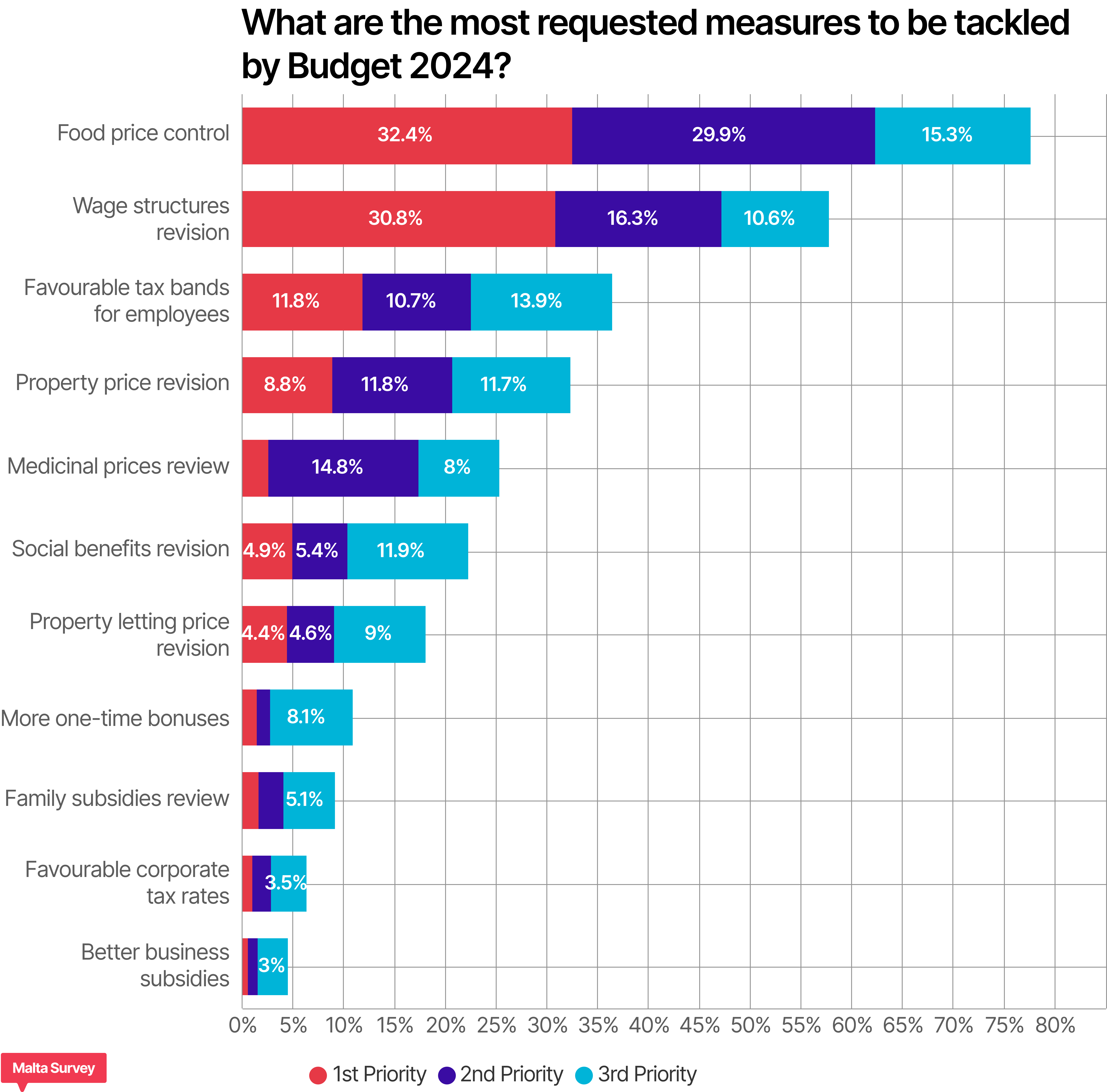
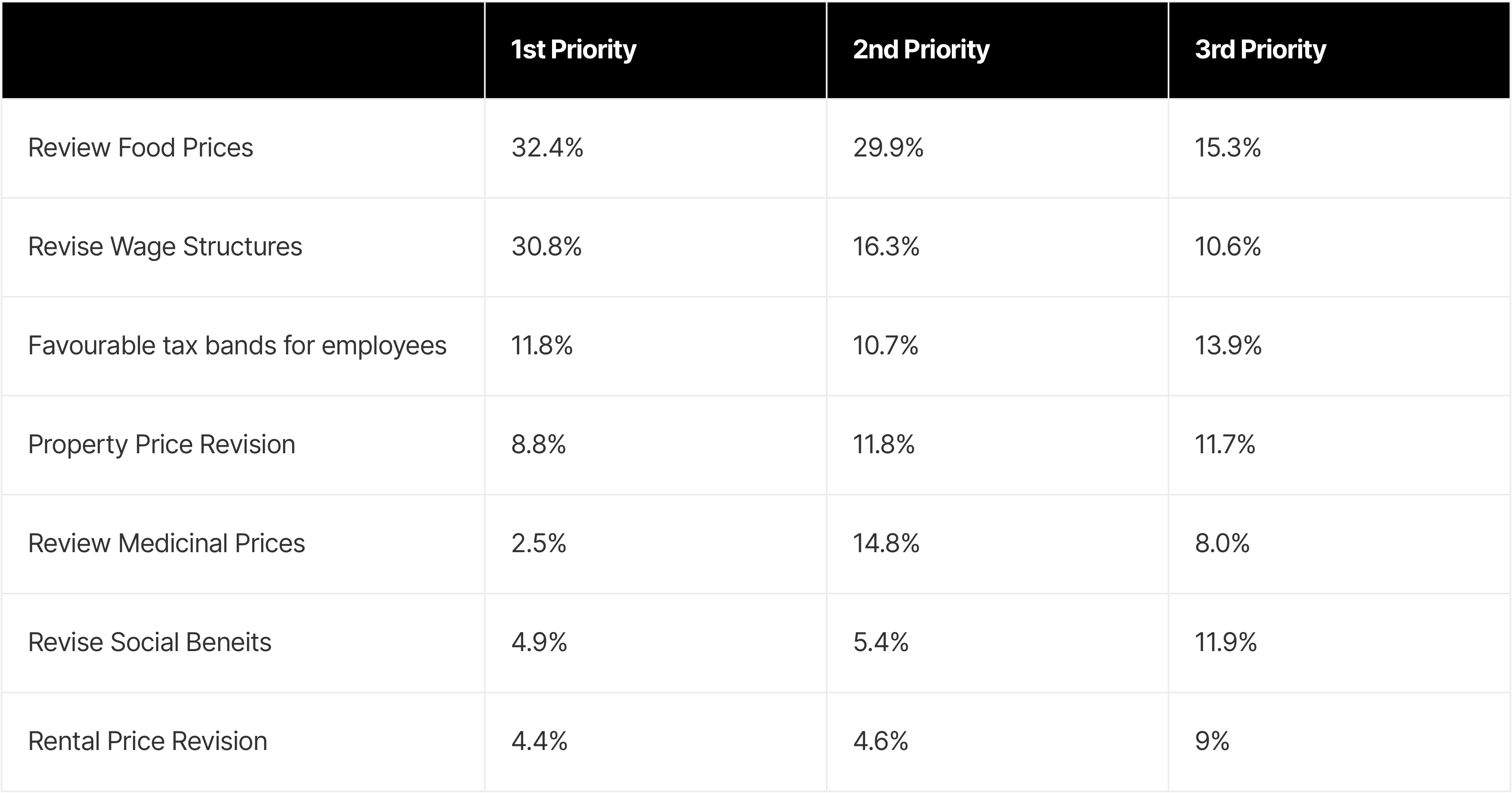
The results show how there are 2 major areas of concern, namely the control of food prices and the necessity to review national wage structures. Food price control has a third of the sample marking it as a first preference (32.4%) and almost another third marking it as a second preference (29.9%). Almost a third of the sample placed a revision of the wage structures as a first priority (30.8%).
Relevant actions put forward by Budget 2024 for the top priorities
- Addressing the need to control food prices due to the significant inflation, Budget 2024 mentioned the IMF’s prediction of inflation decreasing from 3.5% in 2022 to 3% in 2023 and 2.9% in 2024.
- To further address this and the need for a wage structure revision, Budget 2024 announced how the Cost-Of-Living-Adjustment (COLA) will be increasing to €12.81 a week. This includes employees, pensions and persons on social benefits whilst stipends given to students will increase pro-rata.
- To address the need for favourable tax bands for employees, Budget 2024 announced how the taxation imputation systems shall be extended.
- Furthermore, Malta will not be implementing a global minimum effective tax of 15% for companies forming part of MNEs with a minimum annual turnover of €750 million as suggested by the OECD.
- Further extending from 2023, employees earning less than €60,000 shall receive a tax refund of up to €140 according to the brackets below.

- Budget 2024 further extended the residential property stamp duty exemption for first-time buyers and second-time buyers.
- Once more, first-time buyers will benefit from €1,000 annually for 10 years.
- Those who benefit from schemes by the Housing Authority shall benefit from stamp duty and capital gains on their first €200,000 in value.
Part 2: Assessing the beliefs on how to control the deficit
The participants were given the opportunity to express their beliefs on how the Government is to control the deficit through the following proposed measures.
- Rationalise social benefits by developing tighter means testing
- Control the spending of Government Agencies and/or Authorities
- Gradually reduce the number of employees in the public sector
- Rationalise assistance given to business
- Reduce the amount of money spent on national projects
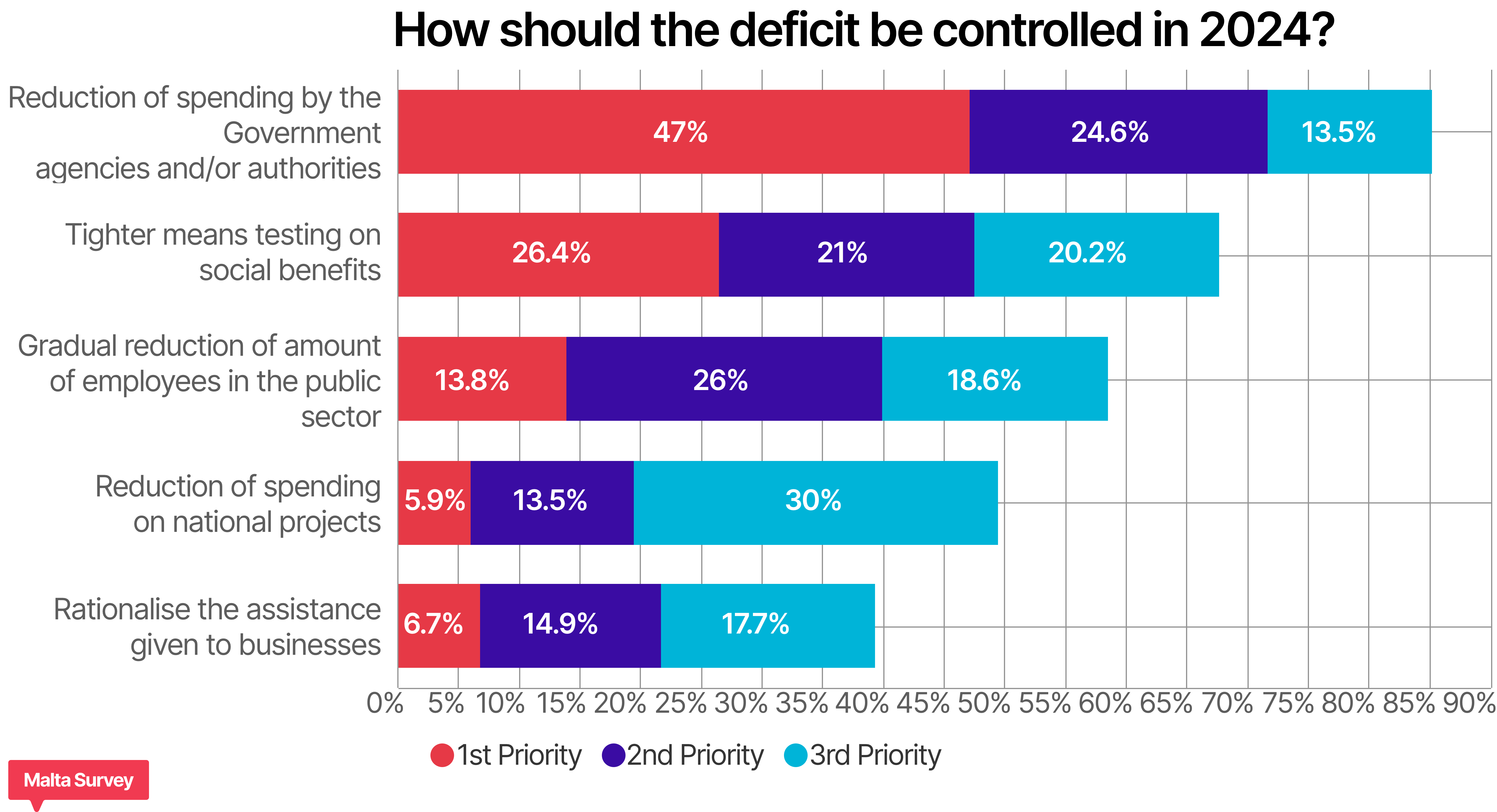
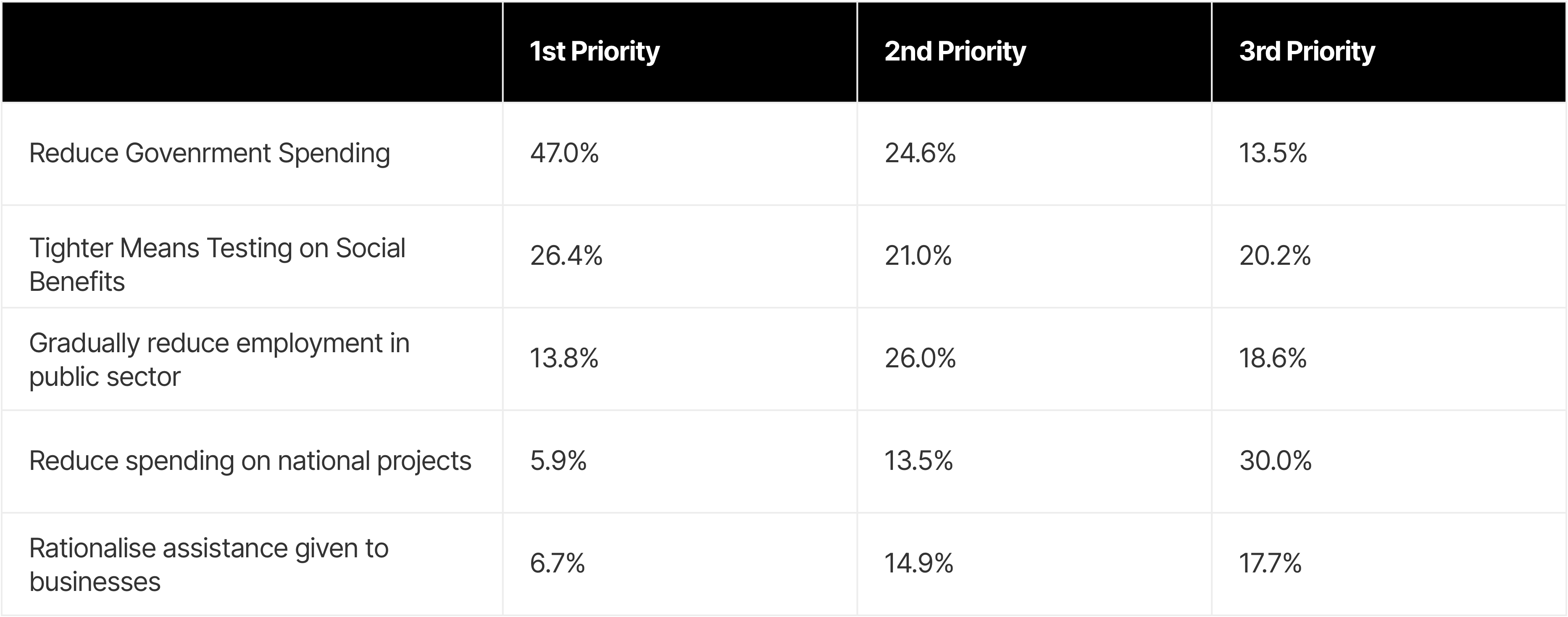
The measure with the largest representation is the reduction of spending by Government agencies and/or authorities with almost half of the sample putting it as a first priority (47%), followed by a quarter of the sample putting it as a second priority (24.6%). The second most requested measure is the establishment of tighter means testing on social benefits to rationalise them, with 26.4% putting this measure as a first priority and a fifth of the sample putting it as a second (21%) and third (20.2%) priority. The third most sought-after measure is the gradual reduction of the number of employees in the public sector showing a need for tighter control on the complement levels of employees working in the public service and public sector.
These three measures are very complimentary by nature and show how a sample comprised of people of a moderate income are aware and concerned about how the government is spending the country’s money.
Relevant actions put forward by Budget 2024 for the top priorities
- As an overall prediction, Budget 2024 stated how the deficit reduce from 5.7% in 2022 to 5% in 2023 and 4.5% in 2024. This comes with the goal of a gradual deficit reduction of 0.5% a year over the next four years.
- There was no direct mention of the reduction of spending by Government agencies and/or authorities
Part 3: Sectors to be addressed in Budget 2024
The third and concluding question based on prioritisation sought to identify the sectors that respondents deem most deserving of paramount consideration through the measures outlined in this year’s budget. Participants were presented with the following choices:
- Health
- Education
- Social Services
- Research and Development
- Employment
- Infrastructure
- Environment
- Energy
- Tourism
- Security
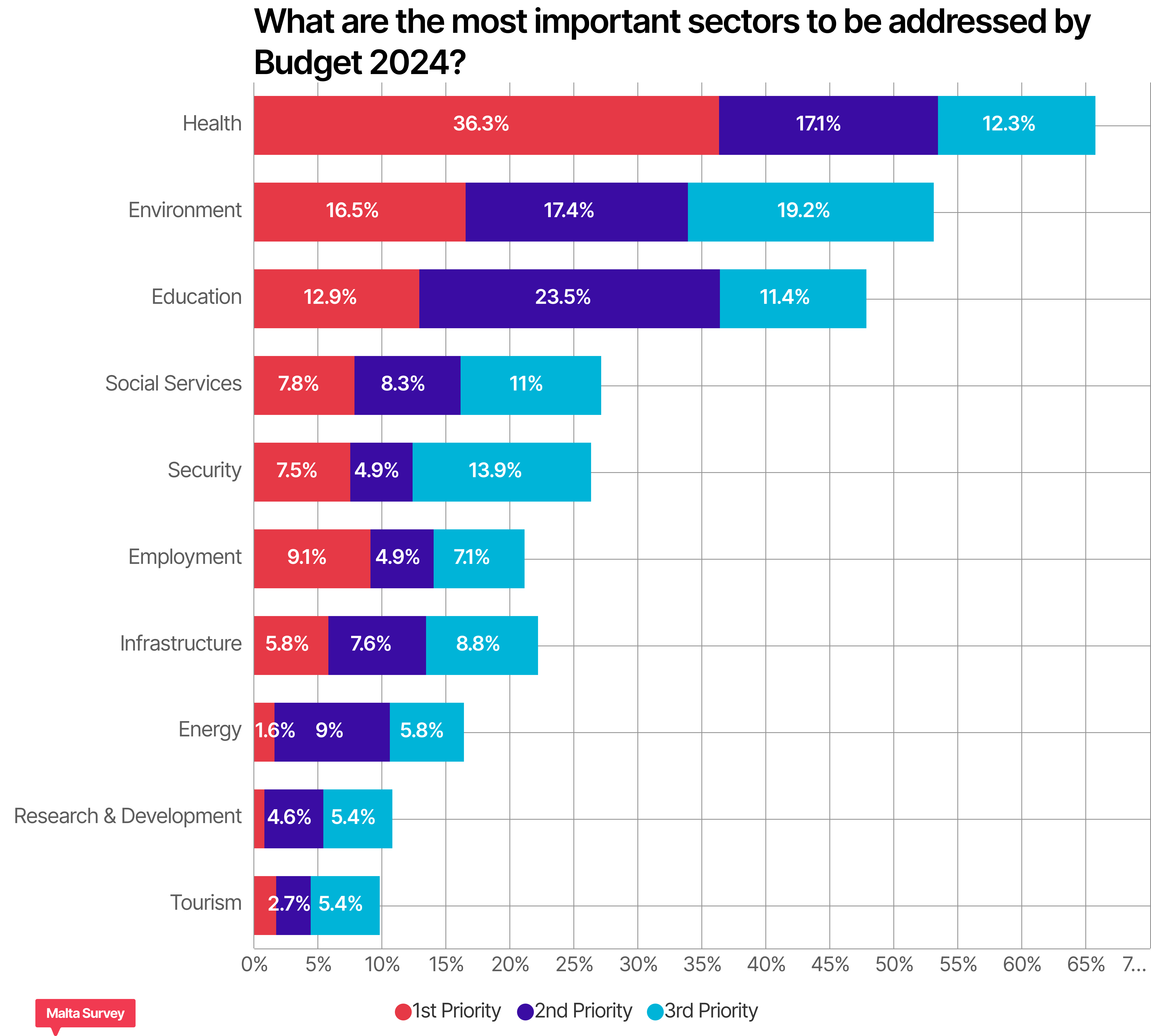
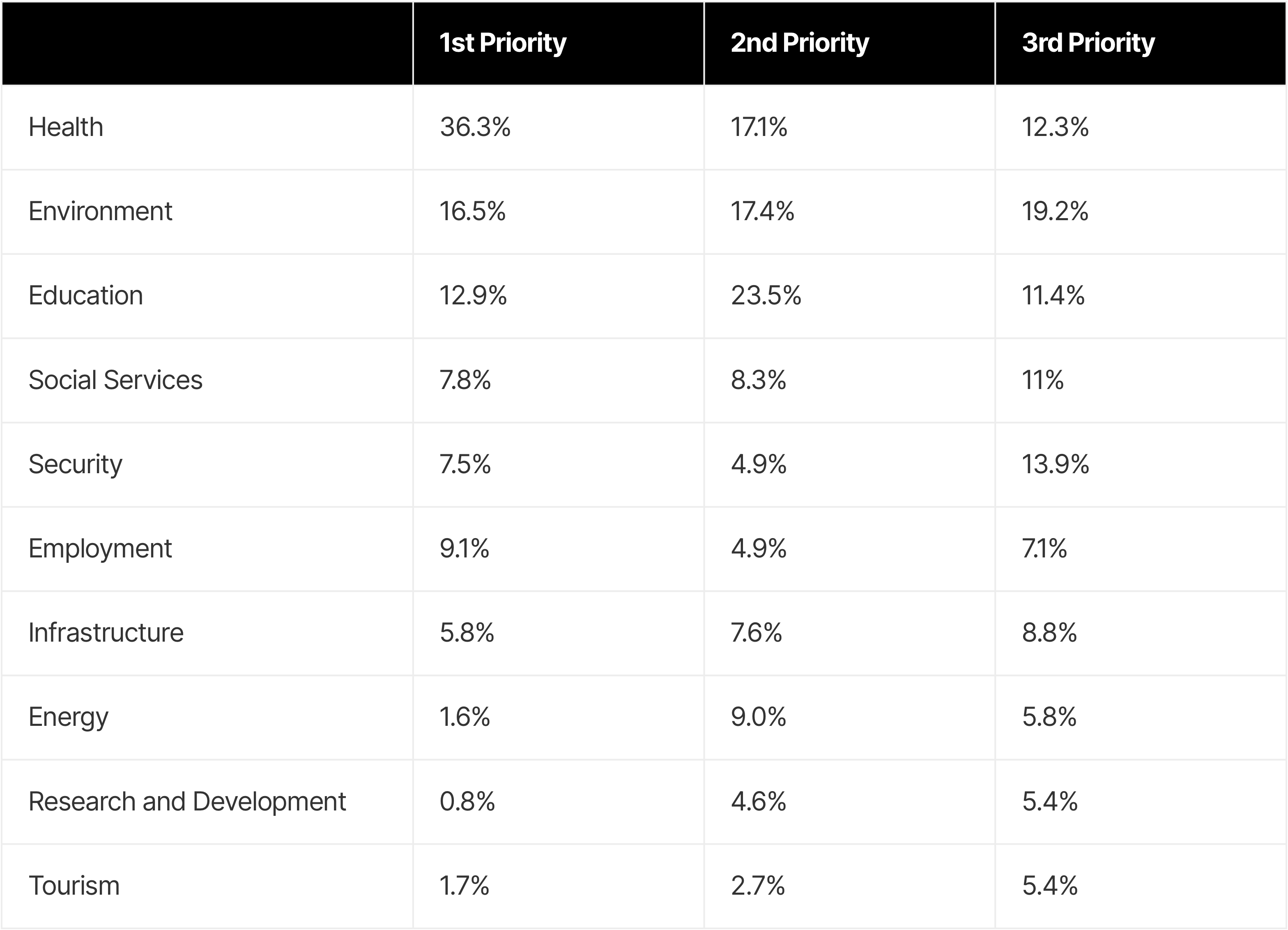
The health sector is significantly the participants’ higher priority area to have an investment from Budget 2024 with more than a third (36.3%) putting it as a first priority and a total sample occupancy of 65.7% between the first, second and third priorities. The second most important sector is the environment with a sample occupancy of 53.1%. The third most important sector is the nation’s education with a sample occupancy of 47.8%.
Relevant actions put forward by Budget 2024 for the top priorities
Health
- A key highlight was the Government’s control step to take control of Gozo’s general hospital, Karin Grech Hospital and St. Luke’s Hospital. €75 million in addition to wages will be invested in Gozo General Hospital and Karin Grech Hospital’s operations.
- Patients related to asthma, pulmonary fibrosis, mental health conditions and IVF will be given free medicinal access.
- Health centres in Mosta, Floriana and Bormla will be further modernised and more clinics will be opened to extend health services including blood transfusion in primary care.
- An extension of Remote Patient Monitoring services for Type 1 Diabetes patients was announced.
Environment
- An emphasis on green areas and public spaces was placed with a highlight on Project Green, conducting projects to regenerate numerous green areas.
- The ECOHIVE project is to be introduced to change the means of waste management and treatment.
- Waste-to-energy technology is expected to be implemented to convert waste into energy, thus increasing overall environmental sustainability.
Education
- Once more, scholarships and tax credits will continue to be provided for tertiary education students furthering their studies.
- Stipends given to students will also increase on a pro rata approach based on the COLA. This results in a €64 increase in 2024.
- The One Tablet per Child initiative has been expanded to provide laptops to all new Year 7 students.
- A special allowance is to be given for parents of students continuing their education beyond the mandatory age of 16.
- Further educational envelopments are expected to be announced through the National education Strategy for 2050.
Budget 2024 Sentiment
Following the assessment of participants’ priorities in terms of fiscal measures, deficit management and national sectors, this concluding section of the survey examined the respondents’ sentiments regarding whether they believed the measures outlined in the 2024 Budget would effectively cater to their needs mentioned above. The response format employed for this question consisted of a fundamental 5-point scale, ranging from “Totally Confident” to “Totally Not Confident”.
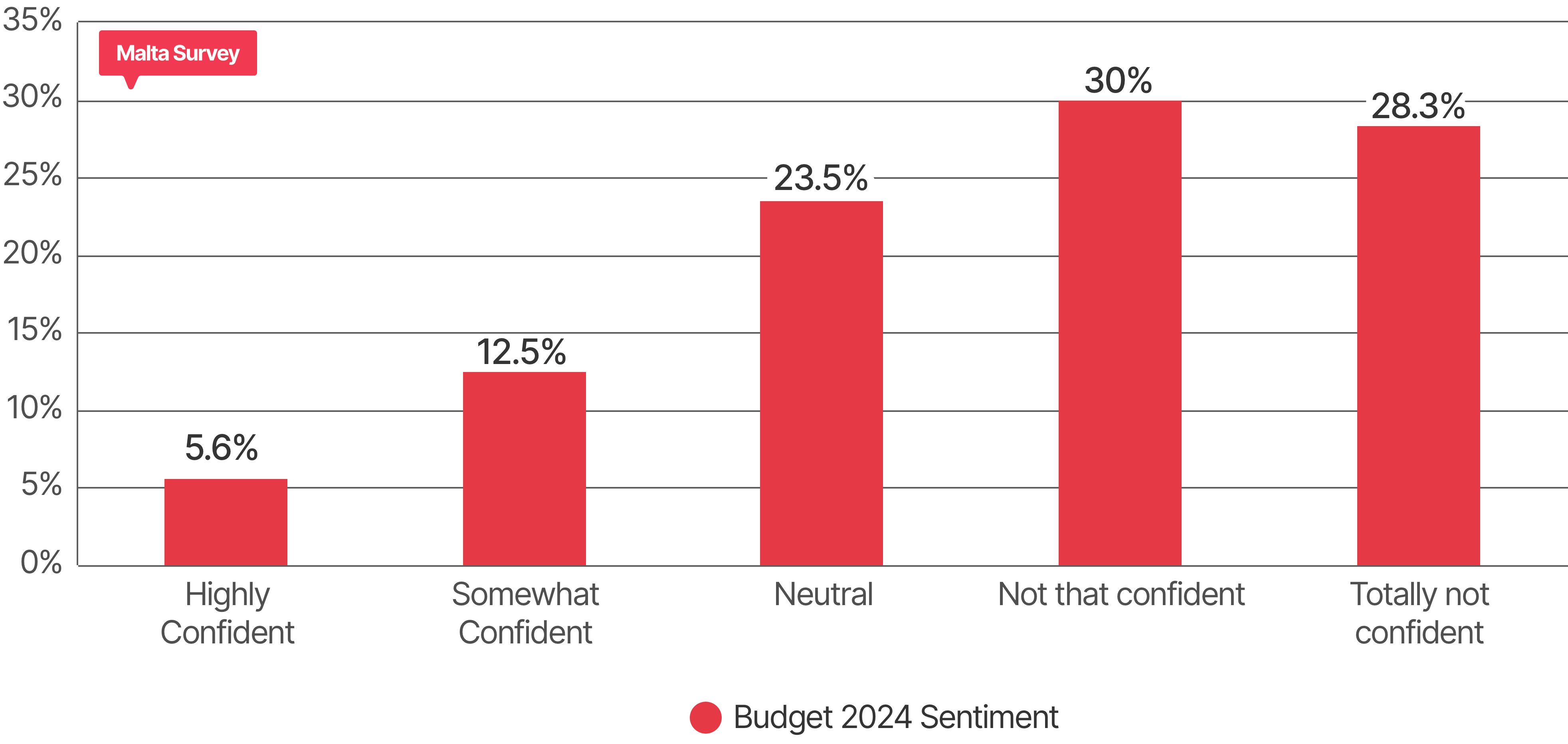
There is a negative sentiment towards the belief that Budget 2024 will address the needs mentioned in terms of the above priorities amongst the participants of this survey. The most populated sentiment is taken up by participants who are not that confident, followed by those who are totally not confident. Thus, a combined 58.3% of the sample have a negative sentiment towards what they expect Budget 2024 will produce in terms of the above three variables. Almost a quarter of the sample (23.5%) are neither confident nor unconfident towards what they expect from Budget 2024. This is followed by 12.5% that are somewhat confident in terms of expectations and 5.6% that are totally confident.


